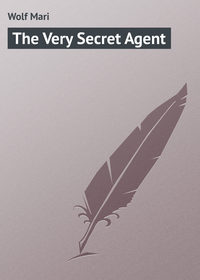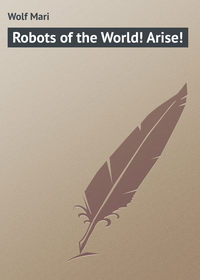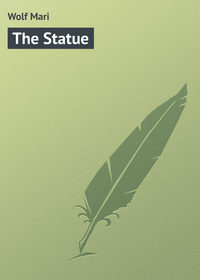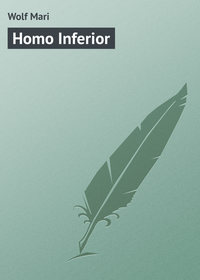 полная версия
полная версияAn Empty Bottle

Wolf Mari
An Empty Bottle
AN EMPTY BOTTLE
Hugh McCann took the last of the photographic plates out of the developer and laid them on the table beside the others. Then he picked up the old star charts – Volume 1, Number 1 – maps of space from various planetary systems within a hundred light years of Sol. He looked around the observation room at the others.
"We might as well start checking."
The men and women around the table nodded. None of them said anything. Even the muffled conversation from the corridor beyond the observation room ceased as the people stopped to listen.
McCann set the charts down and opened them at the first sheet – the composite map of the stars as seen from Earth. "Don't be too disappointed if we're wrong," he said.
Amos Carhill's fists clenched. He leaned across the table. "You still don't believe we're near Sol, do you? You're getting senile, Hugh! You know the mathematics of our position as well as anybody."
"I know the math," Hugh said quietly. "But remember, a lot of our basics have already proved themselves false this trip. We can't be sure of anything. Besides, I think I'd remember this planet we're on if we'd ever been here before. We visited every planetary system within a hundred light years of Sol the first year."
Carhill laughed. "What's there to remember about this hunk of rock? Tiny, airless, mountainless – the most monotonous piece of matter we've landed on in years."
Hugh shrugged and turned to the next chart. The others clustered around him, checking, comparing the chart with the photographic plates of their position, finding nothing familiar in the star pattern.
"I still think we would have remembered this planet," Hugh said. "Just because it is so monotonous. After all, what have we been looking for, all these years? Life. Other worlds with living forms, other types of evolution, types adapted to different environments. This particular planet is less capable of supporting life than our own Moon."
Martha Carhill looked up from the charts. Her face was as tense and strained as her husband's, and the lines about her mouth deeply etched. "We've got to be near Earth. We've just got to. We've got to find people again." Her voice broke. "We've been looking for so long – "
Hugh McCann sighed. The worry that had been growing in him ever since they first left the rim of the galaxy and turned homeward deepened into a nagging fear. He didn't know why he was afraid. He too hoped that they were near Earth. He almost believed that they would soon be home. But the others, their reactions – He shook his head.
They no longer merely hoped. With them, especially with the older, ones, it was faith, a blind, unreasoning, fanatic faith that their journey was almost over and they would be on Earth again and pick up the lives they had left behind fifty-three years before.
"Look," Amos Carhill said. "Here are our reference points. Here's Andromeda Galaxy, and the dark nebula, and the arch of our own Milky Way." He pointed to the places he had named on the plates. "Now we can check some of these high magnitude reference stars with the charts."
Hugh let him take the charts and go through them, checking, rejecting. Carhill was probably right. He'd find Sol soon enough.
It had been too long for one shipful of people to follow a quest, especially a hopeless one. For fifty-three years they had scouted the galaxy, looking for other worlds with life forms. A check on diverging evolutions, they had called it – uncounted thousands of suns without planets, bypassed. Thousands of planetary systems, explored, or merely looked at and rejected. Heavy, cold worlds with methane atmospheres and lifeless rocks without atmospheres and even earth-sized, earth-type planets, with oceans and oxygen and warmth. But no life. No life anywhere.
That was one of the basics they had lost, years ago – their belief that life would arise on any planet capable of supporting it.
"We could take a spectrographic analysis of some of those high magnitude stars," Carhill said. Then abruptly he straightened, eyes alight, his hand on the last chart. "We don't need it after all. Look! There's Sirius, and here it is on the plates. That means Alpha Centauri must be – "
He paused. He frowned and ran his hand over the plate to where the first magnitude star was photographed. "It must be. Alpha Centauri. It has to be!"
"Except that it's over five degrees out of position." Hugh looked at the plate, and then at the chart, and then back at the plate again. And then he knew what it was that he had feared subconsciously all along.
"You're right, Amos," he said slowly. "There's Alpha Centauri – about twenty light years away. And there's Sirius, and Arcturus and Betelgeuse and all the others." He pointed them out, one by one, in their unfamiliar locations on the plates. "But they're all out of position, in reference to each other."
He stopped. The others stared back at him, not saying anything. Little by little the faith began to drain out of their eyes.
"What does it mean?" Martha Carhill's voice was only a whisper.
"It means that we discarded one basic too many," Hugh McCann said. "Relativity. The theory that our subjective time, here on the ship, would differ from objective time outside."
"No," Amos Carhill said slowly. "No, it's a mistake. That's all. We haven't gone into the future. We can't have. It isn't possible that more time has elapsed outside the ship than – "
"Why not?" Hugh said softly. "Why not millions of years? We've exceeded the speed of light, many times."
"Which disproves that space-time theory in itself!" Carhill shouted.
"Does it?" Hugh said. "Or does it just mean we never really understood space-time at all?" He didn't wait for them to answer. He pointed at the small, far from brilliant, star that lay beyond Alpha Centauri on the plates. "That's probably Sol. If it is, we can find out the truth soon enough."
He looked at their faces and wondered what their reactions would be, if the truth was what he feared.
The ship throbbed softly, pulsating in the typical vibrations of low speed drive. In the forward viewscreens the star grew larger. The people didn't look at it very often. They moved about the corridors of the ship, much as they usually moved, but quietly. They seemed to be trying to ignore the star.
"You can't be sure, Hugh." Nora McCann laid her hand on her husband's arm.
"No, of course I can't be sure."
The door from their quarters into the corridor was open. Several more people came in – young people who had been born on the ship. They were talking and laughing.
"Would it be so hard on the young ones, Hugh? They've never seen the Earth. They're used to finding nothing but lifeless worlds everywhere."
One of the young boys in the hall looked up at the corridor viewscreen and pointed at the star and then shrugged. The others turned away, not saying anything, and after a minute they left and the boy followed them.
"There's your answer," Hugh McCann said dully. "Earth's a symbol to them. It's home. It's the place where there are millions more like us. Sometimes I think it's the only thing that has kept us sane all these years – the knowledge that there is a world full of people, somewhere, that we're not alone."
Her hand found his and he gripped it, almost absently, and then he looked up at their own small viewscreen. The star was much bigger now. It was already a definite circle of yellow light.
A yellow G-type sun, like a thousand others they had approached and orbited around and left behind them. A yellow sun that could have been anywhere in the galaxy.
"Hugh," she said after a moment, "do you really believe that thousands of years have gone by, outside?"
"I don't know what to believe. I only know what the plates show."
"That may not even be Sol, up ahead," she said doubtfully. "We may be in some other part of space altogether, and that's why the charts are different."
"Perhaps. But either way we're lost. Lost in space or in time or in both. What does it matter?"
"If we're just lost in space it's not so – so irrevocable. We could still find our way back to Earth, maybe."
He didn't answer. He looked up at the screen and the circle of light and his lips tightened. Whatever the truth was, they didn't have long to wait. They'd be within gravitational range in less than an hour.
He wondered why he was reacting so differently from the others. He was just as afraid as they were. He knew that. But he wasn't fighting the thought that perhaps they had really traveled out of their own time. He wondered what it was that made him different from the other old ones, the ones like Carhill who refused even to face the possibility, who insisted on clinging to their illusions in the face of the photographic evidence.
He didn't think that he was a pessimist. And yet, after only three years of their trip, after only fifty Earthlike but lifeless worlds, he had been the first to consider the possibility that life was unique to Earth and that their old theories concerning its spontaneous emergence from a favorable environment might be wrong.
Only Nora had agreed with him then. Only Nora could face this possibility with him now. The two of them were very much alike in their outlooks. They were both pragmatists.
But this time there would be no long years during which the others could slowly shift their opinions, slowly relinquish their old beliefs and turn to new ones. The yellow sun was too large and urgent in the screen.
"Hugh!"
He turned to the door and saw Amos Carhill standing there, bracing himself against the corridor wall. There was no color at all in Carhill's face.
"Come on up to the control room with me, Hugh. We're going to start decelerating any minute now."
Hugh frowned. He would prefer to stay and watch their approach on the screen, with Nora at his side. He had no duties in the control room. He was too old to have any part in the actual handling of the ship. Amos was old, too. But they would be there, all the old ones, looking through the high powered screens for the first clear glimpse of the third planet from the sun.
"All right, Amos." Hugh got up and started for the door.
"I'll wait here for you, Hugh," Nora said.
He smiled at her and then followed Carhill out into the crowded corridor. No one spoke to them. Most of the people they passed were neither talking, nor paying any attention to anything except the corridor screens, which they could no longer ignore. The few who were talking spoke about Earth and how wonderful it would be to get home again.
"You're wrong, Hugh," Amos said suddenly.
"I hope I am."
The crowd thinned out as they passed into the forward bulkheads. The only men they saw now were the few young ones on duty. Except for their set, anxious faces they might have been handling any routine landing in any routine system.
The ship quivered for just a second as it shifted over into deceleration. There was an instant of vertigo and then it was gone and the ship's gravity felt as normal as ever. Hugh didn't even break stride at the shift.
He followed Carhill to the control room doorway and pushed his way in, taking a place among the others who already clustered about the great forward screen. The pilot ignored them and worked his controls. The screen cleared as the ship's deceleration increased. The pilot didn't look at it. He was a young man. He had never seen the Earth.
"Look!" Amos Carhill cried triumphantly.
The screen focused. The selector swung away from the yellow sun and swept its orbits. The dots that were planets came into focus and out again. Hugh McCann didn't even need to count them, nor to calculate their distance from the sun. He knew the system too well to have any trouble recognizing it.
The sun was Sol. The third planet was the double dot of Earth and moon. He realized suddenly that he had more than half expected to see an empty orbit.
"It's the Earth all right," Carhill said. "We're home!"
They were all staring at the double dot, where the selector focused sharply now. Hugh McCann alone looked past it, at the background of stars that were strewn in totally unfamiliar patterns across the sky. He sighed.
"Look beyond the system," he said.
They looked. For a long time they stared, none of them speaking, and then they turned to Hugh, many of them accusingly, as if he himself had rearranged the stars.
"How long have we been gone?" Carhill's voice broke.
Hugh shook his head. The star patterns were too unfamiliar for even a guess. There was no way of knowing, yet, how long their fifty-three years had really been.
Carhill shook his head, slowly. He turned back to the screen and stared at the still featureless dot that was the Earth. "We can't be the only ones left," he said.
No one answered him. They were still stunned. They couldn't even accept, yet, the strange constellations on the screen.
End of the voyage. Fifty-three years of searching for worlds with life. And now Earth, under an unfamiliar sky, and quite possibly no life at all, anywhere, except on the ship.
"We might as well land," McCann said.
The ship curved away from the night side of the Earth and crossed again into the day. They were near enough so that the planetary features stood out sharply now, even through the dense clouds that rose off the oceans. But although the continental land masses and the islands were clearly defined, they were as unrecognizable as the star constellations had been.
"That must be North America," Amos Carhill said dully. "It's smaller than the continent on the night side…"
"It might be anywhere," Hugh McCann said. "We can't tell. The oceans look bigger too. There's less land surface."
He stared down at the topography thousands of miles below them. Mountains rose jaggedly. There were great plains, and crevasses, and a rocky, lifeless look everywhere. No soil. No erosion, except from the wind and the rains.
"There's no chlorophyll in the spectrum," Haines said. "It seems to rule out even plant life."
"I don't understand." Martha Carhill turned away from the screen. "Everything's so different. But the moon looked just exactly like it always did."
"That's because it has no atmosphere," Hugh said. "So there's no erosion. And no oceans to sweep in over the land. But I imagine that if we explored it we'd find changes. New craters. Maybe even new mountains by now."
"How long has it been?" Carhill whispered. "And even if it's been millions of years, what happened? Why aren't there any plants? Won't we find anything?"
"Maybe there was an atomic war," the pilot said.
"Maybe." Carhill had thought of that too. Probably all of them had. "Or maybe the sun novaed."
No one answered him. The concept of a nova and then of its dying down, until now the sun was just as it had been when they left, was too much.
"The sun looks hotter," Carhill added.
The ship dropped lower, its preliminary circle of the planet completed. It settled in for a landing, just as it had done thousands of times before. And the world below could have been any of a thousand others.
They dropped quickly, braking through the atmosphere, riding it down. The topography came up to meet them and the general features blurred, leaving details standing out sharply, increasing in sharpness as if the valleys and mountains below were tiny microscopic crystals under a rapidly increasing magnification.
The pilot picked their landing place without difficulty. It was a typical choice, a spot on the broad shelving plain at the edge of the ocean. The type of base from which all tests on a planet could be run quickly, and a report written up, and the files of another world closed and tagged with a number and entered in one of the great storage encyclopedias.
Even to Hugh there was an air of unreality about the landing, as if this planet wasn't really Earth at all, despite its orbit around the sun, despite its familiar moon. It looked too much like too many others.
The actual landing was over quickly. The ship quivered, jarred slightly, and then was still, resting on the gravelled plain that had obviously once been part of the ocean bed. The ocean itself lay only a few hundred yards away.
Hugh McCann looked out through the viewscreen, turned to direct vision now. He stared at the waves swelling against the shore and his sense of unreality deepened. Even though this was what he had more than half expected, he couldn't quite accept it, yet.
"We might as well go out and look around," he said.
"Air pressure, Earth-norm." Haines began checking off the control panel by rote. "Composition: oxygen, nitrogen, water vapor – "
"There's certainly nothing out there that could hurt us," Martha Carhill snapped. "What could there be?"
"We might check for radioactivity," Hugh said quietly.
She turned and stared at him. Her mouth opened and then snapped shut again.
"No," Haines said. "There's no radioactivity either. Everything's clear. We won't need space suits."
He pressed the button that opened the inner locks.
Carhill glanced over at him and then switched on the communicator, and the noises from the rest of the ship flooded into the control room. Everywhere people were milling about. Snatches of talk drifted in, caught up in the background as various duty officers, reported clearance on the landing. Most of the background voices were young, talking too loudly and with too much forced cheerfulness about what lay outside the ship.
Hugh sighed, as aware of all the people as if he were out in the corridors with them. It was the space-born ones who were doing most of the talking. The children, the young people, the people no longer young but still born since the voyage started, still looking upon Earth more as a wonderful legend than as their own place of origin.
The old ones, those who had left the Earth in their own youth, had the least of all to say. They knew what was missing outside. The younger ones couldn't really know. Even the best of the books and the pictures and the three dimensional movies can give only a superficial idea of what a living world is like.
"Hugh." Carhill clutched his arm.
"Yes, Amos."
"There must be people, somewhere. There have to be. Our race can't be dead."
Hugh McCann looked past him, out at the sky and the clouds of water vapor that swirled up to obscure the sun. The stars, of course, were completely hidden in the daylight.
"If there are any others, Amos, we can be pretty certain they're not on Earth."
"They may have left. They may have gone somewhere else."
"No!" Martha Carhill's face twisted and then went rigid. "There's no one anywhere. There can't be. It's been too long. You saw the stars, Amos – the stars – all wrong, every one of them!"
Her hands came up to her face and she started to cry. Amos crossed over to her and put his arms around her.
Hugh McCann watched them for a moment and then he turned and left them and went out through the locks after the young people. He didn't know what to think. He wished that they had never turned back to Earth at all, that they had kept going, circling around the rim of the galaxy forever.
He went through the outer lock and then down the ramp to the ground.
He stood on the Earth again, for the first time since his early youth. And it was not the same. There was bare rock under his feet and bare rock all around him, gravel and boulders and even fine grained sand. But no dust. No dirt. No trace of anything organic or even ever touched by anything organic.
He had walked too many worlds like this. Too many bare gray worlds with bare gray oceans and clouds of vapor swirling up into the warm air. Too many worlds where there was wind and sound and surf; where there should have been life, but wasn't.
This was just another of those worlds. This wasn't Earth. This was just a lifeless memory of the Earth he had known and loved. For fifty-three years they had clung to the thought of home, of people waiting for them, welcoming them back someday. Fifty-three years, and for how many of those ship-years had Earth lain lifeless like this?
He looked up at the sky and at all the stars that he couldn't see and he cursed them all and cursed time itself and then, bitterly, his own fatuous stupidity.
The people came out of the ship and walked about on the graveled plain, alone or in small groups. They had stopped talking. They seemed too numbed by what they had found to even think, for a while.
Shock, Hugh McCann thought grimly. First hysteria and tears and loud unbelief, and now shock. Anything could come next.
He stood with the warm wind blowing in his face and watched the people. In the bitter mood that gripped him he was amused by their reactions. Some of them walked around aimlessly, but most, those who were active in the various departments, soon started about the routine business of running tests on planetary conditions. They seemed to work without thinking, by force of habit, their faces dazed and uncaring.
Conditioning, Hugh thought. Starting their reports. The reports that they know perfectly well no one will ever read.
He wandered over to where several of the young men were sending up an atmosphere balloon and jotting down the atmospheric constituents as recorded by the instruments.
"How's it going?" he said.
"Earth-norm. Naturally – " The young man flushed.
"Temperature's up though. Ninety-three. And a seventy-seven percent humidity."
He left them and walked down across the rocks to the ocean's edge. Two young girls were down there before him, sampling the water, running both chemical and biological probing tests.
"Hello, Mr. McCann," the taller girl said dully. "Want our report?"
"Found anything?" He knew already that there was nothing to find. If there were life the instruments would have recorded its presence.
"No. Water temperature eighty-six. Sodium chloride four-fifths Earth normal." She looked up, surprised. "Why so low?"
"More water in the ocean, maybe. Or maybe we've had a nova since we were here last."
It was getting late, almost sunset. Soon it would be time for the photographic star-charts to be made. Hugh brought himself up short and smiled bitterly. He too was in the grip of habit. Still, why not? Perhaps they could estimate, somehow, how many millions of years had passed.
Why? What good would it do them to find out?
After a while the sun set and a little later the full moon rose, hazy and indistinct behind the clouds of water vapor. Hugh stared at it, watched it rise higher until it cleared the horizon, a great bloated bulk. Then he sighed and shook his head to clear it and started to work. The clouds were thick. He had to move the screening adjustment almost to its last notch before the vapor patterns blocked out and the stars were bright and unwavering and ready to be photographed. He inserted the first plate and snapped the picture of the stars whose names he knew but whose patterns were wrong, some subtly, some blatantly.
There was something he was overlooking. Some other factor, not taken into account. He developed the first plates and compared them with the star charts of Earth as it had been before they left it, and he shook his head. Whatever the factor was, it eluded him. He went back to work.
"Oh, here you are, Hugh."
He jumped at the sound of Carhill's voice. He had been working almost completely by habit, slowly swinging the telescope across the sky and snapping the plates. And trying to think.
"Why waste time on that?" Carhill added bitterly. "Who's ever going to see our records now?"
Behind Carhill, several of the other old ones nodded. Hugh was surprised that they had managed to come back to the ship without his hearing them. But of course they had come back in at sundown, as usual on a routine check, and now they were gathering to compile their reports. Hugh looked from face to face, wondering if he too was as numb and dazed and haggard appearing as they were. He probably was.
"What do you suggest, Amos?" he said.
"I say there's no use going on," Carhill said flatly. "You've all run your tests. And what have you found? No fossils. Not even a single-celled life form in the ocean. No way even to tell how many millions of years it's been."






